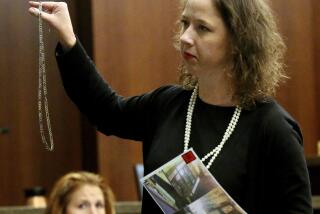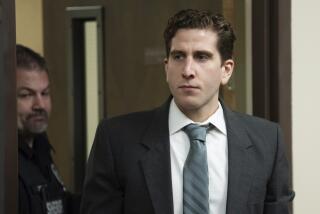A Case No One Wants Is Still Shopping for a Courtroom : Judiciary: Several venues, fearing violent aftermath, avoid the new trial for ex-policeman in slaying of two blacks.
- Share via
MIAMI — The manslaughter retrial of a former Miami police officer charged in the deaths of two black men--a trial that many expect will offer the next high-profile test of both the judicial system and the nation’s racial equilibrium--is looking for a home. No one wants it.
“This case is a political hot potato,” said sociologist Marvin Dunn, who has studied and written about riots that have racked Miami over the past 12 years. “There is not a city in the state of Florida that wants this trial.”
That became clear this week when a judge in Tallahassee ordered the retrial of William Lozano out of the Florida capital and sent it back to Orlando, an alternative venue chosen earlier. Chief Judge William L. Gary, of the Leon County Circuit Court, said that fellow circuit court Judge W. Thomas Spencer of Dade County acted without due process when in May he moved the trial to Tallahassee in an effort to assure that more blacks would be in the jury pool.
In January, 1989, Lozano, 33, fired his revolver at an oncoming motorcycle in the Overtown section of Miami. The driver was struck in the head and died instantly; a passenger was killed in the subsequent crash. The deaths touched off three days of bloody rioting, and in December of 1989 Lozano was convicted of killing the two men.
Lozano, who is a native of Colombia, was sentenced to seven years in prison. He appealed, saying he did not receive a fair trial because Miami jurors feared an acquittal would lead to more rioting. In June of 1991, a three-judge appeals court ruled in Lozano’s favor, overturning the conviction and calling the trial “fundamentally unfair.”
In April of this year Spencer moved the trial from Miami to Orlando, a city with a black population of only 10%. But in the aftermath of the Rodney G. King case, and the Los Angeles riots, Spencer unilaterally decided to move the Lozano trial to Tallahassee, a city that approximates Miami’s 20% black population.
That made no one happy. Tallahassee’s city commissioners, the police chief and black community leaders protested. Lozano’s defense attorney, Roy E. Black, asked the appeals court to remove Spencer from the case on the grounds the judge was influenced by the news media and public opinion. The prosecutor joined the motion, which is still pending.
According to Black, Spencer moved the trial to Tallahassee “on a whim. The real issue in this case,” he added, “is that no one is following judicial rules. Everyone is afraid of what’s going to happen after a verdict. They are trying to prevent rioting. It is a difficult and explosive case.”
D. Marvin Jones, a professor of law at the University of Miami, agrees the Lozano case has been compromised by politics. “The tragedy is that this is one of the most important cases in our history, where we are attempting to show that even if the police are white and the victims are black, we can try the case fairly,” Jones said. “But the court can’t resist putting its finger to the political wind to see which way it’s flowing.”
Dunn, the sociologist, added that the venue changes “raise serious questions among blacks in Miami about the capacity of the judicial system to handle cases like this.” He said the retrial should be held in Miami.
Chief Judge Gary, in Tallahassee, said in his order that a judge, on his own motion, could not order a change of venue, or transfer jurisdiction of the case to another circuit. He said Spencer’s decision to move the trial to Tallahassee “without appropriate motion of the parties or consent of the defendant is invalid, being constitutionally infirm and without authority.”
He remanded the trial back to Orlando, saying, in effect, that his circuit would have nothing to do with it.
In Miami, a coalition of 15 black church leaders met last Wednesday to demand that the retrial be held in Miami.
Lozano, meanwhile, is facing financial problems. He was fired from the police department after his conviction. Last month a mortgage company foreclosed on his $95,000 home. He is working with his father building furniture, Black said, because “all the employers tell him they can’t take the risk of hiring him.”
Already declared indigent, Lozano Thursday won an additional order from Spencer allowing him to claim from the state the costs of expert witnesses.
The retrial was scheduled to begin Oct. 6. Black said that now appears unlikely.
Researcher Anna Virtue in Miami contributed to this story.
The Trial No One Wants
The case of a Miami policeman charged in the deaths of two blacks began in Miami, was moved to Orlando and Tallahassee, then back to Orlando
More to Read
Sign up for Essential California
The most important California stories and recommendations in your inbox every morning.
You may occasionally receive promotional content from the Los Angeles Times.










